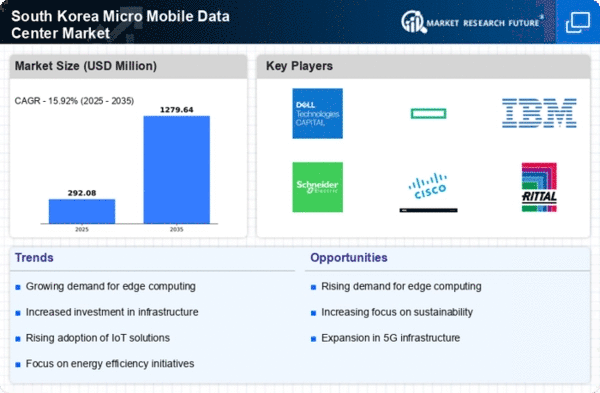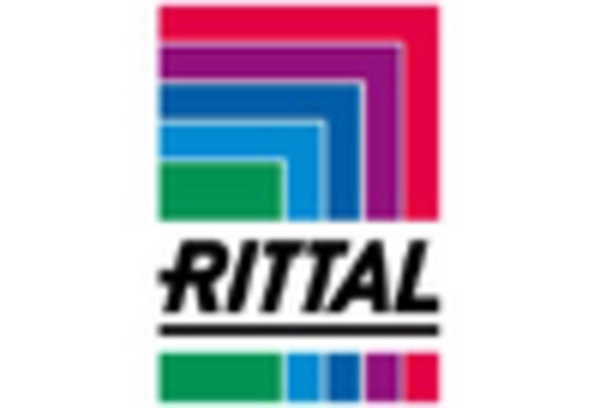Emergence of 5G Technology
The advent of 5G technology is poised to have a transformative impact on the micro mobile-data-center market. With the rollout of 5G networks across South Korea, the demand for low-latency data processing solutions is expected to rise sharply. Micro mobile data centers are well-suited to meet the requirements of 5G applications, which necessitate rapid data transmission and processing capabilities. This technological advancement is likely to drive market growth at a rate of around 14% as businesses seek to leverage the benefits of 5G for enhanced connectivity and performance. The integration of micro mobile data centers with 5G technology presents a unique opportunity for organizations to optimize their operations and improve service delivery. As 5G continues to expand, the micro mobile-data-center market is expected to flourish, reflecting the evolving technological landscape.
Adoption of IoT Technologies
The proliferation of Internet of Things (IoT) devices in South Korea is significantly influencing the micro mobile-data-center market. With an estimated 30 million IoT devices expected to be deployed by 2026, the demand for localized data processing solutions is becoming more pronounced. Micro mobile data centers offer the flexibility and scalability required to manage the data generated by these devices effectively. This trend is particularly relevant in smart city initiatives, where real-time data collection and analysis are essential for urban management. The integration of IoT technologies necessitates robust data infrastructure, thereby propelling the growth of the micro mobile-data-center market. As organizations look to harness the potential of IoT, the reliance on micro mobile data centers is likely to increase, further driving market expansion.
Rising Need for Data Processing
The micro mobile-data-center market is experiencing a surge in demand due to the increasing need for efficient data processing capabilities. As businesses in South Korea continue to generate vast amounts of data, the necessity for localized data centers becomes apparent. This trend is particularly evident in sectors such as finance and telecommunications, where real-time data processing is critical. The market is projected to grow at a CAGR of approximately 15% from 2025 to 2030, driven by the need for rapid data access and processing. Companies are increasingly investing in micro mobile data centers to enhance their operational efficiency and reduce latency. This rising need for data processing is a key driver for the micro mobile-data-center market, as organizations seek to optimize their data management strategies.
Increased Focus on Disaster Recovery
The micro mobile-data-center market is increasingly driven by a focus on disaster recovery solutions among South Korean businesses. As organizations recognize the critical importance of data resilience, the demand for mobile data centers that can be rapidly deployed in emergency situations is on the rise. These centers provide a reliable backup solution, ensuring business continuity in the face of unforeseen disruptions. The market is expected to grow by approximately 10% as companies invest in robust disaster recovery strategies. Micro mobile data centers offer the necessary infrastructure to support these initiatives, allowing organizations to safeguard their data and maintain operational stability. This growing emphasis on disaster recovery is a significant driver for the micro mobile-data-center market, reflecting the changing priorities of businesses in an increasingly unpredictable environment.
Shift Towards Hybrid Cloud Solutions
The micro mobile-data-center market is benefiting from the growing trend of hybrid cloud solutions among South Korean enterprises. Organizations are increasingly adopting hybrid models to balance the benefits of public and private cloud environments. This shift necessitates the deployment of micro mobile data centers to facilitate seamless integration and data management across different platforms. The market is projected to witness a growth rate of around 12% as businesses seek to enhance their cloud capabilities while maintaining control over sensitive data. Micro mobile data centers provide the agility and flexibility required for hybrid cloud strategies, making them an attractive option for companies looking to optimize their IT infrastructure. This trend underscores the importance of micro mobile data centers in supporting the evolving needs of businesses in the digital landscape.
















